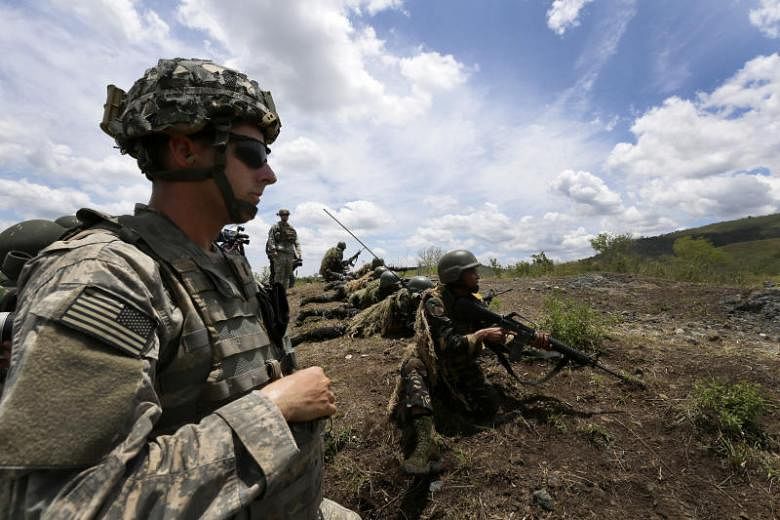MANILA - The Philippines has rescinded its decision to scrap a key defence pact that allows American troops to hold military exercises in the country, as it recalibrates its relations with its oldest ally in view of the coronavirus pandemic and China's latest actions in contested waters.
Foreign Secretary Teodoro Locsin said in a Twitter post late on Tuesday (June 2) that he has informed the US embassy in Manila that the Philippines was "suspending" for six months its decision to abrogate its Visiting Forces Agreement (VFA) with Washington "in light of political and other developments in the region".
In a news briefing on Wednesday (June 3), Mr Locsin said the order came from President Rodrigo Duterte.
He said Mr Duterte "changed his mind" because of the "vast and swiftly changing circumstances of the world, the time of pandemic and heightened superpower tensions".
Defence Secretary Delfin Lorenzana said Mr Duterte realised that, with the pandemic, "we need to cooperate with other countries".
"It's not timely to end the VFA at this time," he said.
Mr Lorenzana said the Philippines would maintain its schedule of joint military exercises with the US for now.
He said he expected the Americans to step up its assistance, as the Philippines struggles to contain a local outbreak of Covid-19.
The Philippines this week eased one of the strictest and longest lockdowns in Asia, after health officials reported that there had been fewer deaths from Covid-19 and hospitals were no longer overwhelmed by sick patients.
But the domestic economy had stalled because of the lockdown, with 5 million Filipinos forecast to be jobless by year's end and many companies shutting down as a crippling recession sets in.
Philippine Ambassador to the US Jose Manuel Romualdez told ABS-CBN News Channel the situation in the South China Sea was also considered.
"The political reason is there's quite a number of things that are happening right now in the South China Sea," he said.
The Philippines this year filed a diplomatic protest after Beijing decided to divide the South China Sea into two districts: one for the Paracel island chain and the other for the Spratlys, which spans waters, reefs, atolls and islands that an international tribunal has ruled are inside the Philippines' "exclusive economic zone".
Security officials also recently revealed that a Chinese warship had its guns aimed at a Philippine Navy corvette during a brief encounter near a disputed reef.
Signed in 1998, the VFA gave legal cover to thousands of US troops who were rotated to the Philippines for military exercises and humanitarian assistance operations.
President Rodrigo Duterte threatened in January to repeal the pact over a US decision to deny entry to his political ally Ronald dela Rosa.
Mr Dela Rosa was a police chief who served as an enforcer of Mr Duterte's deadly anti-drugs crackdown in 2016. Thousands of mostly poor suspects were killed under the campaign, alarming the US and other Western governments.
Mr De la Rosa, who is now a senator, said he supported Mr Duterte's decision to stick with the VFA for now.
"Foreign policies can be flexible at times, depending on the realities obtained in the bilateral, regional or global area of foreign relations," he said.
But the left-leaning group Bagong Alyansang Makabayan (New Patriotic Alliance) said Mr Duterte's reversal was "shameful".
"It shows that the Philippine government is not at all serious in its decision to scrap this unequal treaty and assert national sovereignty," it said.
Mr Duterte's allies had tried to dissuade him from terminating the VFA, saying a review would be a more appropriate response.
Mr Locsin had said previously that abrogating the accord would undermine the Philippines' security and foster aggression in the disputed South China Sea.
It would mean scrapping more than 300 joint activities with US forces "which the Philippine military and law enforcement agencies need to enhance their capabilities in countering threats to national security", he said.
American forces have provided intelligence, training and aid that allowed the Philippines to deal with human trafficking, cyber attacks, illegal narcotics and terrorism.
US military presence has also served as a deterrent to aggressive actions in the disputed South China Sea, said Mr Locsin.
The Philippines had also considered reviewing a separate defence pact signed in 2014, the Enhanced Defence Cooperation Agreement.
That agreement allowed the extended stay of US forces and authorised them to build and maintain barracks and warehouses and store defence equipment and weapons inside five designated Philippine military camps.
"This is great news," said Representative Rufino Biazon, vice-chairman of the defence and security committee of the House of Representatives.


